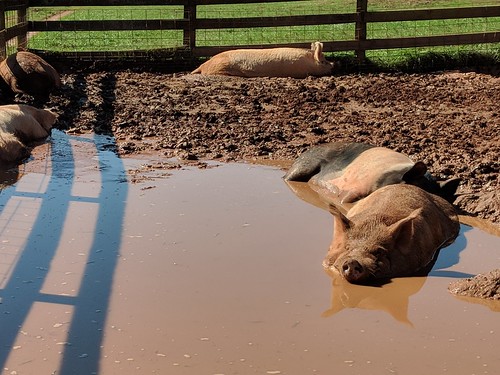
Greetings,
This month I've just got a couple articles each on soil and learning from failure, plus one on social and environmental synergies and trade-offs. If you know someone who wants to sign up to receive these summaries, they can do so at http://bit.ly/sciencejon
Also, as a reminder, I'm hosting a webinar on December 3 (1p EST) with recommendations on how scientists may be able to achieve more real world impact via their research. You can learn more and register here: https://zoom.us/webinar/register/WN_Q78ubqH9TL6tkmLQCRyAsw and read the draft paper the talk is based on at http://bit.ly/strongerscience
SOIL:
Our paper opining on soil carbon (Bradford et al. 2019) is out! The opening two lines sum it up well: "Soil-based initiatives to mitigate climate change and restore soil fertility both rely on rebuilding soil organic carbon. Controversy about the role soils might play in climate change mitigation is, consequently, undermining actions to restore soils for improved agricultural and environmental outcomes." In other words, while scientists disagree a lot about whether boosting soil carbon is useful for climate mitigation, we all pretty much agree it's important for fertile and productive agricultural lands. Read a bit more at http://sciencejon.blogspot.com/2019/11/soil-carbon-what-is-it-good-for.html or just read the paper (it's only 1,800 words).
Lugato et al. 2018 uses daycent to model the net GHG impact of building soil carbon in farms via cover crops, reduced tillage, and keeping crop residues. They found a lot of variation across sites, but that overall reducing tillage and crop residue retention offered modest but long term (>80 years) net GHG benefits without impacting crop yield much. N-fixing cover crops led to stronger C sequestration and net GHG reductions over the first 20 years, but after 40 years it switched to being a GHG source (due to N2O) that strengthened over time (albeit with a small crop yield boost). If fertilization wasn't reduced to account for the new N from the cover crop, it would be a stronger GHG source much sooner. They also didn't model non-N-fixing cover crops like rye.
ORGANIZATIONAL LEARNING / FAILURE:
Catalano et al. 2018 argues that conservation would do well to learn how to deal with failure from other disciplines like medicine, business, and aviation. Specifically, we need to recognize how much we can learn from failure (sometimes more than success), rather than fearing it and avoiding tough measures as a result. They cover how we learn from failure, why it's hard to constructively engage with it, how understanding cognitive biases can help (see Table 1 for a great list to consider), and the role of leaders in supporting efforts to identify and learn from failure. The example of "no rank" military aviation debriefs is interesting - they promote a culture with sharing useful feedack at its core. My main take-away is that dealing with failure is not only key, but it's hard and requires careful thought to do well.
Catalano et al. 2019 is an analysis of 59 peer-reviewed articles discussing reported conservation failure (Table 2 has a great list of synonyms and euphemisms for failure). Most articles did use the term failure, and almost half did so in the abstract. See Table 3 for an interesting typology of causes of failure (including people, action, information, funding, and economic and political) and how common each was, and Table 4 for example text of each kind. Overall they found reporting failure in conservation is rare (~1/4 as often as reporting success), it's typically not framed as useful for learning, and 'people' are the most common cause of failure (e.g. especially stakeholder relationships, but also bad past experiences, fear, etc.). They also call for authors to report failure in a way that makes it easy for others to learn from their mistakes.
PEOPLE AND NATURE:
Gill et al. 2019 looks at 75 studies across 4 kinds of marine conservation work to evaluate social and environmental synergies and tradeoffs (as well as equity). Specifically: marine protected areas (MPAs - representing the majority of studies considered), community-based MPAs, environmental certification, and community-based management (CBM). They found diverse impacts, but with very few rigorous studies designed to show causality. But there was potential for both positive and negative cascading effects depending on access to resources (especially for fishers). Fig 6 has an interesting breakdown of how many studies covered each subtopic, and provides some potential categories of trade-offs to think about.
REFERENCES:
Bradford MA, Carey CJ, Atwood L, Bossio D, Fenichel EP, Gennet S, Fargione J, Fisher JRB, Fuller E, Kane DA, Lehmann J, Oldfield EE, Ordway EM, Rudek J, Sanderman J, Wood SA. 2019. Soil carbon science for policy and practice. Nature Sustainability .
Catalano AS, Redford K, Margoluis R, Knight AT. 2018. Black swans, cognition, and the power of learning from failure. Conservation Biology 32: 584–596.
Catalano AS, Lyons-White J, Mills MM, Knight AT. 2019. Learning from published project failures in conservation. Biological Conservation 238: 108223.
Gill DA, Cheng SH, Glew L, Aigner E, Bennett NJ, Mascia MB. 2019. Social Synergies, Tradeoffs, and Equity in Marine Conservation Impacts. Annual Review of Environment and Resources 44: 347–372.
Lugato E, Leip A, Jones A. 2018. Mitigation potential of soil carbon management overestimated by neglecting N2O emissions. Nature Climate Change 8: 219–223.
Sincerely,
Jon
p.s. If you'd like to keep track of what I write as well as what I read, I always link to both my informal blog posts and my formal publications (plus these summaries) at http://sciencejon.blogspot.com/
No comments:
Post a Comment
Questions, comments, suggestions, and complaints welcome.